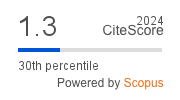Deoxypyridinoline and mineral levels in gingival crevicular fluid as disorder indicators of menopausal women with periodontal disease
Downloads
Downloads
Dharmayanti AWS. Deoxypyridinoline level in gingival crevicular fluid as alveolar bone loss biomarker in periodontal disease. Dent J (Maj Ked Gigi). 2012; 45(2): 102–6.
Mariotti A. Sex steroid hormones and cell dynamics in the periodontium. Crit Rev Oral Biol Med. 1994; 5(1): 27–53.
Markou E, Eleana B, Lazaros T, Antonios K. The influence of sex steroid hormones on gingiva of women. Open Dent J. 2009; 3: 114–9.
Yoshihara A, Hayashi Y, Miyazaki H. Relationships among bone turnover, renal function and periodontal disease in elderly Japanese. J Periodontal Res. 2011; 46: 491–6.
Bhardwaj A, Bhardwaj S. Effect of menopause on women's periodontium. J Midlife Health. 2012; 3(1): 5–9.
Guiglia R, Di-Fede O, Lo-Russo L, Sprini D, Rini G, Campisi G. Osteoporosis, jawbones and periodontal disease. Med Oral Patol Oral Cir Bucal. 2013; 18(1): e93–9.
Khurshid Z, Mali M, Naseem M, Najeeb S, Zafar M. Human gingival crevicular fluids (GCF) proteomics: an overview. Dent J. 2017; 5: 1–8.
Barros SP, Williams R, Offenbacher S, Morelli T. Gingival crevicular as a source of biomarkers for periodontitis. Periodontol 2000. 2016; 70(1): 53–64.
Hirose A, Terauchi M, Akiyoshi M, Owa Y, Kato K, Kubota T. Depressive symptoms are associated with oxidative stress in middleaged women: a cross-sectional study. Biopsychosoc Med. 2016; 10: 1–6.
Phipps AI, Ichikawa L, Bowles EJA, Carney PA, Kerlikowske K, Miglioretti DL, Buist DSM. Defining menopausal status in epidemiologic studies: a comparison of multiple approaches and their effects on breast cancer rates. Maturitas. 2010; 67(1): 60–6.
Ardiani DK, Dharmayanti AWS, Pujiastuti P. Kadar fosfor (P) dalam cairan sulkus gingiva pada penderita penyakit periodontal. IDJ. 2014; 3(1): 1–9.
Sharma R, Sharma P, Kumar P, Gupta G. Role of magnesium in post-menopausal women with osteoporosis and osteopenia. Asian J Pharm Clin Res. 2016; 9:198–9.
Hosthor SS, Mahesh P, Priya SA, Sharada P, Jyotsna M, Chitra S. Quantitative analysis of serum levels of trace elements in patients with oral submucous fibrosis and oral squamous cell carcinoma: a randomized cross-sectional study. J Oral Maxillofac Pathol. 2014; 18(1): 46–51.
Koregol AC, More SP, Nainegali S, Kalburgi N, Verma S. Analysis of inorganic ions in gingival crevicular fluid as indicators of periodontal disease activity: a clinico-biochemical study. Contemp Clin Dent. 2011; 2(4): 278–82.
Penido MGMG, Alon US. Phosphate homeostasis and its role in bone health. Pediatr Nephrol. 2012; 27: 2039–48.
Razmandeh R, Nasli-Esfahani E, Heydarpour R, Faridbod F, Ganjali MR, Norouzi P, Larijani B, Khoda-Amorzideh D. Association of zinc, copper and magnesium with bone mineral density in Iranian postmenopausal women – a case control study. J Diabetes Metab Disord. 2014; 13: 1–6.
Gur A, Colpan L, Nas K, Cevik R, Sarac J, Erdogan F, Duz MZ. The role of trace minerals in the pathogenesis of postmenopausal osteoporosis and a new effect of calcitonin. J Bone Min Metab. 2002; 20: 39–43.
Kasuma N. Correlation between magnesium and alkaline phosphatase from gingival crevicular fluid periodontal diseases. Dent J (Maj Ked Gigi). 2015; 48(3): 130–4.
He LY, Zhang XM, Liu B, Tian Y, Ma WH. Effect of magnesium ion on human osteoblast activity. Braz J Med Biol Res. 2016; 49(7): 1–6.
Fijorek K, Püsküllüoğlu M, Tomaszewska D, Tomaszewski R, Glinka A, Polak S. Serum potassium, sodium and calcium levels in healthy individuals - literature review and data analysis. Folia Med Cracov. 2014; 54(1): 53–70.
Boras VV, Brailo V, Rogić D, Puhar I, Bosnjak A, Badovinac A, Rogulj AA. Salivary electrolytes in patients with periodontal disease. RJPBCS. 2016; 7(2): 8–14.
Moe SM. Disorders involving calcium, phosphorus, and magnesium. Prim Care. 2008; 35(2): 1–19.
Terauchi M, Honjo H, Mizunuma H, Aso T. Effects of oral estradiol and levonorgestrel on cardiovascular risk markers in postmenopausal women. Arch Gynecol Obstet. 2012; 285: 1647–56.
- Every manuscript submitted to must observe the policy and terms set by the Dental Journal (Majalah Kedokteran Gigi).
- Publication rights to manuscript content published by the Dental Journal (Majalah Kedokteran Gigi) is owned by the journal with the consent and approval of the author(s) concerned.
- Full texts of electronically published manuscripts can be accessed free of charge and used according to the license shown below.
- The Dental Journal (Majalah Kedokteran Gigi) is licensed under a Creative Commons Attribution-ShareAlike 4.0 International License

















